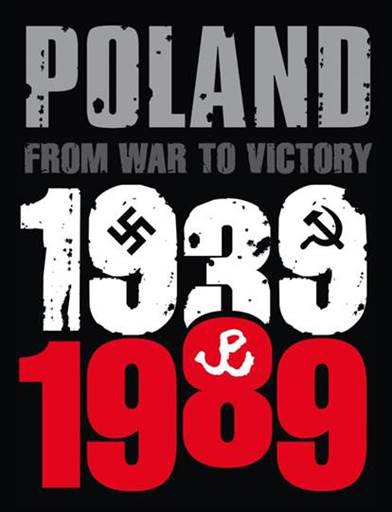 Historical events can frame and form a nation; the memory of them can define and unite a people. In the case of Poland, its historical memory has strengthened the country’s national identity. The Warsaw-based Institute for National Remembrance (IPN) is dedicated to preserving the memories and events that have shaped Poland and its people. In partnership with the Center for Eurasian, Russian, and East European Studies at Georgetown University in Washington DC, IPN’s Public Education Office displayed its exhibition ‘From War to Victory, 1939 – 1989’ at the University from March 18 – 22. The exhibition shared the stories, tragedies and triumphs from that crucial period in Poland’s history with students and the wider public.
Historical events can frame and form a nation; the memory of them can define and unite a people. In the case of Poland, its historical memory has strengthened the country’s national identity. The Warsaw-based Institute for National Remembrance (IPN) is dedicated to preserving the memories and events that have shaped Poland and its people. In partnership with the Center for Eurasian, Russian, and East European Studies at Georgetown University in Washington DC, IPN’s Public Education Office displayed its exhibition ‘From War to Victory, 1939 – 1989’ at the University from March 18 – 22. The exhibition shared the stories, tragedies and triumphs from that crucial period in Poland’s history with students and the wider public.
At the opening of the exhibition, Poland’s Ambassador to the U.S., Ryszard Schnepf, emphasized the timeliness of this initiative as we commemorate the 70th year anniversary of the end of WWII. Ambassador Schnepf described the war as one of the “most dramatic and difficult moments in Polish history.” Following the Ambassador’s remarks, IPN historian, Przemysław Gasztold-Seń, highlighted some of the main events from 1939 – 89 during an introductory lecture to the exhibition. The photos and excerpts from 50 years of history had both elements of suffering and joy, when Poland found itself, as Gasztold-Seń asserted, “between a rock and a hard place.”
In an interview, Gasztold-Seń expounded on the historical events detailed in the exhibition, including life under the Communist regime, Poland’s transition and the country’s fate and future.
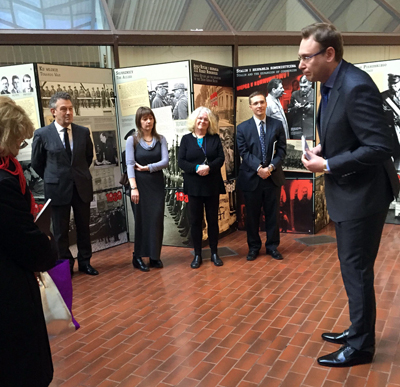
IPN historian Przemysław Gasztold-Seń at the opening of the exhibit at Georgetown University
B.T.: During the lecture, you spoke about the extermination of the intelligentsia and how the communist regime restricted independent civic activity and education. Today, however, Poland has a thriving civil society and strong educational sector. What kept civil society and independent thought alive in Poland during the communist period?
P.G.S.: The Communists tried to change the Polish universities and schools by inhibiting professors’ influence on students. After WWII, however, that was very hard to achieve, because most of the teachers did not support Communist ideology. During the Stalinist period, Polish education was threatened by the policy of Sovietization, but after the 1956 October Thaw, that threat was diminished. Poles had also many ‘enclaves’ free from communist influence, such as the Catholic Church or independent scouting associations.
B.T.: You mentioned that the communist authorities in Poland refrained from severe political violence, as seen in Argentina, Chile, etc., up to the imposition of Martial Law. You also said that Poland experienced a wide range of social and cultural freedoms more so than other countries under communist rule. Why do you think they refrained from violence and what made Poland different?
P.G.S.: Leaders of the Solidarity movement opposed the idea of ‘an eye for an eye and a tooth for a tooth.’ Solidarity had approximately 10 million members and it was one of the biggest, non-violent movements in the world. The Communist government was aware that the opposition condemned violence. This approach put the authorities in a difficult position because the state and party apparatus, with several thousand armed militia and security services, were prepared to defend the country against an armed enemy. This is why the Soviets advised General Jaruzelski in 1981 to find hidden warehouses of weapons, which Solidarity had presumably stored. This was obviously a hoax and only used for propaganda purposes.
I would also say Solidarity’s non-violent approach was based on experiences from WWII and the Warsaw Uprising in 1944, when Polish elites were killed. The leaders of the opposition in the 70s and 80s did not want to sacrifice the lives of young Poles who represented the next generation. They were keenly aware of the huge cost of an armed conflict.
B.T.: In what ways did Poles adapt and manage to exist under the communist regime in a way that kept hope and national identity alive?
P.G.S.: They tried to be faithful to their traditions and habits. They knew that outside their homes they could not speak openly about the Katyń crime, Soviet atrocities, and cooperation between the USSR and the III Reich, as these issues were forbidden and not reported in the regime’s mass media. The history of Poland was transmitted to young generations during family meetings. The Catholic Church in Poland played a very important role in maintaining the national identity. In the 1970s and 80s, the Polish opposition was involved in many historic and patriotic events to preserve national heritage.
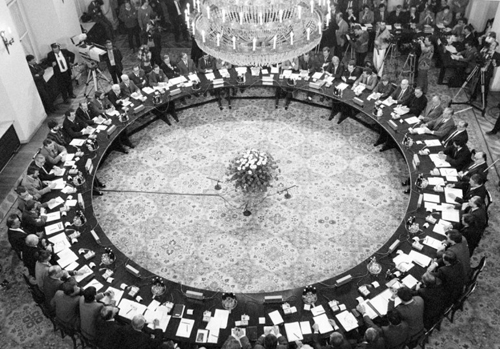
Round Table Talks, 1989
PHOTO: Jaroslaw Stachowicz / Forum
B.T.: What examples from Poland’s history during this period and transition processes can be shared with countries experiencing conflict or going through a similar transition?
P.G.S.: Some people say that the Round Table talks in 1989 were a mistake and that the opposition should have broken the agreements and quickly removed the Communists from power. Others perceive the Round Table as a conspiracy, in which some carefully selected opposition members, together with Polish United Worker’s Party leaders, established new political rules which guaranteed impunity for communist crimes. These people, some former opposition activists and victims of the regime’s repressions, often say that today’s Poland is not the country they fought for.
I look at the transition period more broadly. When enemies agree to sit at the table, push away anger and desire for revenge, they find a way to compromise. Experiences with dialogue, conversation, peaceful meetings, in my opinion, are worth sharing. But to achieve these goals we have to have two sides willing to cooperate and keep their promises. The Polish experience of the peaceful transition should be shared and used as a successful path for other countries at the crossroads between authoritarian rule and democracy. Two years ago, IPN went to North Africa after the Arab Spring to present the Polish experience from the transition period. The Polish Ministry of Foreign Affairs and the President’s office also organized many events on the difficulties and problems faced during the initial period of building democracy, such as judicial and legislative changes.
B.T.: You said that the 50 years of communist rule had a happy ending – a peaceful transition to democracy. How optimistic are you about Poland’s future?
P.G.S.: I am an optimist but Poland still suffers from many negative effects of 50 years under communist rule. We have made great progress, though, by joining the EU and NATO. The current political situation on Poland’s eastern borders, however, is disconcerting. Russian aggression against Ukraine includes attempts to revise the history of the twentieth century. The future is still largely unpredictable.
CR
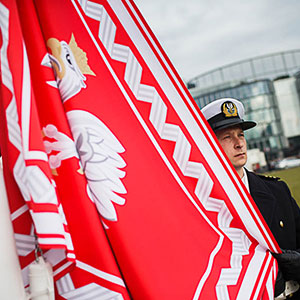

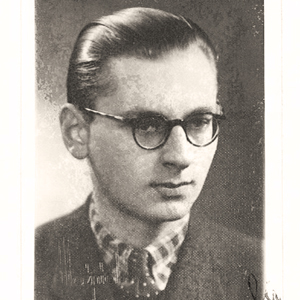
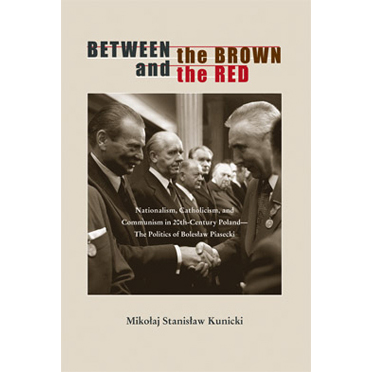
Pingback: Welcome to Summer 2015!